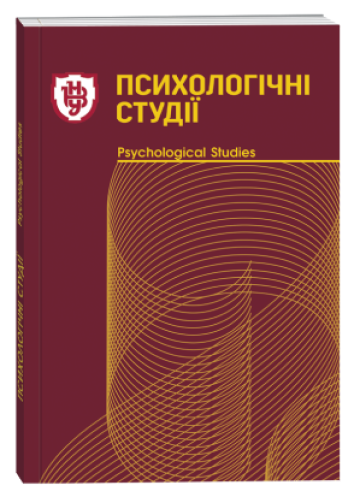THE ROLE OF THE FAMILY IN THE ORGANIZATION OF PSYCHOSOCIAL REHABILITATION AND PSYCHIATRIC ASSISTANCE FOR PATIENTS WITH MENTAL DISORDERS
DOI:
https://doi.org/10.32782/psych.studies/2023.3.16Keywords:
personality with mental disorders, family, social environment, psychosocial rehabilitation, psychological well-beingAbstract
The purpose of the article is to highlight effective, practical methods of psychosocial rehabilitation of patients with mental disorders. The article emphasizes the importance of outpatient services in the process of recovery of a person with mental disorders and the awareness that treatment can take place in a family environment, with the possibility of work. It is noted that psychosocial rehabilitation of the mentally ill is a complex process aimed at the recovery and development of various spheres of human life. Psychosocial rehabilitation interventions differ depending on the needs of patients, the place where rehabilitation interventions are carried out (hospital or community), as well as cultural and socio-economic conditions of the country, where a person with mental disorders lives. The author states that currently there are a large number of models of psychosocial rehabilitation and views on the methods of its implementation. However, all scientists and practitioners came to the conclusion that the result of rehabilitation measures should be the reintegration (return) of mentally ill people into society. At the same time, patients should feel no less full-fledged citizens than other population groups. The author proved the vital role of the family in the psychosocial rehabilitation of persons with mental disorders. First of all, it is important to understand that relatives of patients are indispensable allies in treatment. In view of the above, the goal of rehabilitation can be defined as follows: it is the improvement of the quality of life and social functioning of people with mental disorders by overcoming their social isolation and increasing their active life and civic position. The obtained result of the scientific analysis of the subject area can be used in the practical activities of clinical psychologists, practical psychologists, medical workers in the organization of psychiatric care for the population, for drawing up educational programs for improving the professional qualifications of medical psychologists and psychiatrists. The article substantiates the relevance and novelty of research directions for further development of the problem of improving the organization and content of psychiatric care for patients with mental disorders.
References
Metodologia de aconselhamento psicológico para superar uma crise de vida / V. Overchuk et al. Laplage Em Revista, 7(Extra-E). 2021. 359–368 pp.
Associations between loneliness and perceived social support and outcomes of mental health problems: A systematic review / J. Wang et al. BMC Psychiatry. 2018. 18(1). 156 p.
Idores A. R., Geraldo A., Martins H. The Road to Digitally-Driven Mental Health Services: Remote Psychological Interventions. Digital Therapies in Psychosocial Rehabilitation and Mental Health. IGI Global. 2022. P. 42–71.
Physiological biomarkers of chronic stress: A systematic review / S. Noushad et al. International journal of health sciences. 2021. 15(5). 46 p.
Long-term functional, psychological, emotional, and social outcomes in survivors of firearm injuries / M. A. Vella et al. JAMA surgery. 2020. 155(1). P. 51–59.
Rohleder N. Stress and inflammation – the need to address the gap in the transition between acute and chronic stress effects. Psychoneuroendocrinology. 2019. 105. P. 164–171.
Cirineu C. T., Fiorati R. C., Muñoz C. M. Autonomy of people with psychological suffering from the perspective of work: Perceptions of users and their families. Revista Colombiana de psiquiatria (English ed.). 2022. 51(4). P. 272–280.
Moench K. M., Breach M. R., Wellman C. L. Chronic stress produces enduring sex-and region-specific alterations in novel stress-induced c-Fos expression. Neurobiology of stress, 2019. 10. 100147.
Psychometric properties of the Stanford Acute Stress Reaction Questionnaire (SASRQ): A valid and reliable measure of acute stress / E. Cardeña et al. Trauma Stress. 2000. 13(4). P. 719–734.
Role of rehabilitation in chronic stress-induced exhaustion disorder: A narrative review / J. Wallensten et al. Rehabil. Med. 2019. 51(5). P. 331–342.
Crosswell A.D., Lockwood K.G. Best practices for stress measurement: How to measure psychological stress in health research. Health Psychology Open. 2020. 7(2). 2055102920933072.
Garfin D.R., Thompson R.R., Holman E.A. Acute stress and subsequent health outcomes: A systematic review. Psychosom. Res., 2018. 112. P. 107–113.
Rehabilitation decreases exercise-induced oxidative stress in chronic obstructive pulmonary disease / E.M. Mercken et al. American journal of respiratory and critical care medicine. 2005. 172(8). P. 994–1001.
Chronic stress and endothelial dysfunction: mechanisms, experimental challenges, and the way ahead / L. Sher et al. American Journal of Physiology-Heart and Circulatory Physiology. 2020. 319(2). P. 488–506.
Hannibal K.E., Bishop M.D.: Chronic stress, cortisol dysfunction, and pain: a psychoneuroendocrine rationale for stress management in pain rehabilitation. Physical therapy. 2014. 94(12). P. 1816–1825.







